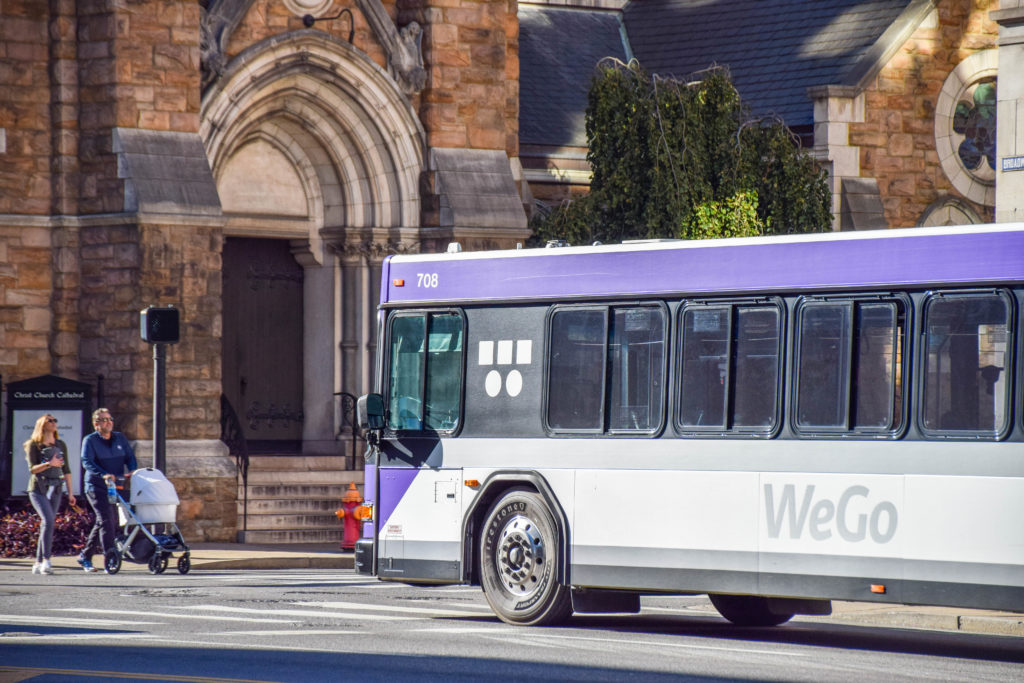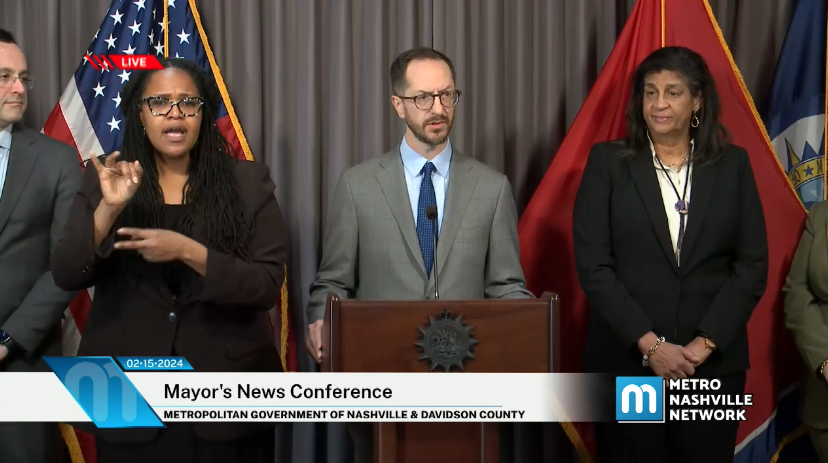
Nashville voters will get another chance to decide on the future of the city’s transit system. Mayor Freddie O’Connell announced Thursday morning that he will be pursuing a Nov. 5 ballot measure to expand transit. Such a plan will rely on dedicating tax dollars to transportation, though specifics about funding were not immediately provided.
The mayor is calling the plan “Choose How You Move – An All-Access Pass to Sidewalks, Signals, Service, and Safety.” He says it will draw from more than 70 planning efforts in the past decade and more than 65,000 pieces of input from the community.
More: Breaking down Nashville Mayor Freddie O’Connell’s $514M capital spending plan
“The cost of transportation is nearly equal to the cost of housing in Nashville – and it’s past time we tackle our transportation issues so that Nashville becomes a more livable city. A place you want to stay,” O’Connell wrote in a statement.
Thursday’s announcement does not include a detailed plan. That’s expected in late March, including how the proposal would tap into tax dollars. The mayor suggested that a 30-year buildout would cost over a billion dollars. Between now and then, the mayor’s office will lead an array of meetings and planning efforts, including with two advisory committees — one “technical” and one community-based. Meetings involving councilmembers and neighborhood associations are also expected.
The mayor expects the draft plan to be ready for an audit in late March.
Information from the administration is online at Nashville.gov/transit.
What is a transit referendum?
Under Tennessee state law, local governments can establish taxes specifically to fund transit — and without state approval. The law, known as the IMPROVE Act, was signed by Gov. Bill Haslam in 2017.
Under the IMPROVE Act, there are a number of options for what this tax can be — there’s an additional sales tax, hotel/motel tax, car rental tax.
Funding has not been spelled out for the newly announced referendum.
But, getting a referendum to voters is not a simple task. The law requires local governments to create a Transit Improvement Plan, detailing intended projects, their costs and their funding sources. This usually takes at least three months, as governments outline the project and collect public feedback. Then, the plan must undergo a third-party review, as well as get the green light from the state comptroller and the Metro Council. And, all of this before it hits the ballot, where it would need to win over a majority of Davidson County voters.
What happened last time?
In 2018, when Nashville’s voters faced their first and only transit referendum, they voted it down.
“Let’s Move Nashville,” an ambitious transit proposal put forth by then-mayor Megan Barry, failed resoundingly: 64% of voters cast ballots against the measure. Some voters blamed its loss on the cost and scope (the $5.4 billion plan would have funded 26 miles of light rail, 25 miles of rapid bus transit and a nearly two mile long tunnel underneath downtown Nashville). A case study from the TransitCenter, a national, pro-transit group, claimed “Let’s Move” made three major missteps:
- The TransitCenter claimed the Barry administration’s approach was too insular – it didn’t seek necessary input of the community or stakeholders prior to its release. So, when Barry resigned mid-term, the plan’s close ties to her identity caused the plan to lose its focus.
- The group also said 2018 approach was inconsistent: while the administration’s said they were prioritizing groups like Black Nashvillians and affordable housing advocates, they didn’t align the outreach or the plan with the desires of those residents.
- Finally, the Transit Center claimed that the 2018 approach was too hasty. With only eleven months between the passage of the IMPROVE Act (authorizing the referendum) and the vote, the approach prioritized speed — and, with that, lost opportunity for robust public engagement.
The 2018 plan also faced a robust opposition campaign: an anonymously-funded opposition group, as well as a grassroots effort from the Koch Brothers-backed group Americans For Prosperity pushed hard against the plan.
Following O’Connell’s announcement, Americans For Prosperity released a statement saying they are waiting to see the details before assuming a position, but that they hope it will “respect already overburdened Davidson County taxpayers.”
“We think Mayor O’Connell is a smart leader who will hopefully make an earnest effort to learn from the mistakes his predecessor made that led us to unfortunately having to kill the last transit plan,” AFP-TN state director Tori Venable wrote in a statement. “It was a bad deal for taxpayers.”
On Thursday, O’Connell spelled out several likely differences in the coming referendum, including:
- more emphasis on sidewalks, traffic signals, safety and infrastructure
- less emphasis on light rail
- no proposed transit tunnel beneath downtown
“We’re trying to eliminate the element of surprise here. This plan will not have a $1 billion tunnel under downtown in it. It will not include investments in rail-based transit service. This is that focus on sidewalks, signals, safety and service,” O’Connell said. “In that period of six years … transit has only become more popular, and the need for it has only become more urgent.”

Why now?
So, if the 2018 referendum’s hasty approach led to it’s demise, why is O’Connell launching a plan with only nine months before it appears on the ballot?
When O’Connell took office last year, he compiled three advisory transition committees. In their policy recommendations, the group focused on “How Nashville Moves,” encouraged O’Connell to consider placing a referendum on the 2024 ballot, given the anticipated high turnout — which, experts say, can lead to greater chances of success.
“The failure of Nashville’s 2018 transit referendum holds many lessons, including the importance of holding any vote about dedicated, long-term funding for transit during a high-turnout election that maximizes its chance of success,” the group wrote. “November 2024 is the closest high-turnout election.”
On Thursday, the mayor emphasized how much work has already gone into transportation planning in the prior decade, and called attention to how many local political candidates shared their commitment to dedicated transit funding in the latest election cycle.
“We’ve been stuck in neutral and we’ve got to move,” O’Connell said. “Delaying actually makes the problem worse.”
What’s at stake?
Of the major cities in the United States, there are only four operating without dedicated funding streams for transit: Hartford, Memphis, Nashville and Orlando.
Transit agencies across the state are relying on a patchwork of federal, state and local dollars to fund their systems. And, on all levels, the funding trails behind the national average.
The mayor says there will be a period of engagement before a fully detailed program is unveiled.
This is a developing story that was last updated at 3:30 p.m.

